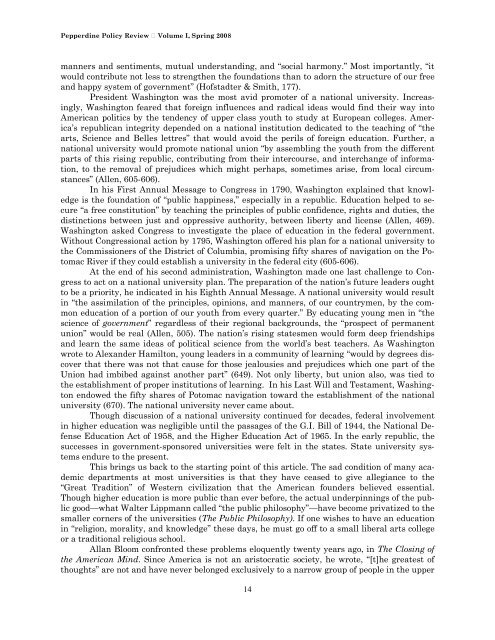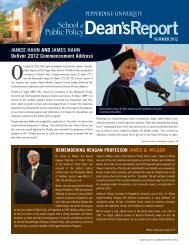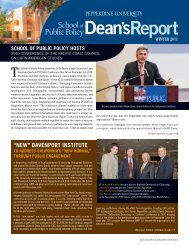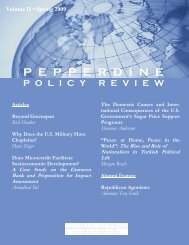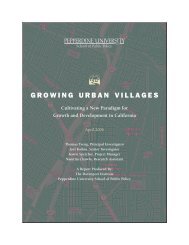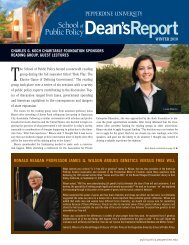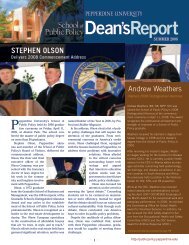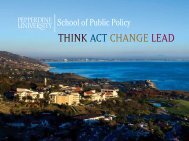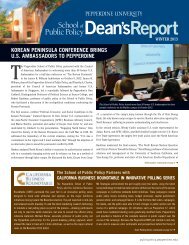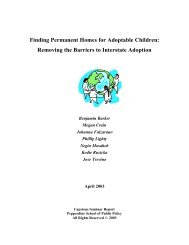Pepperdine University School of Public Policy
Pepperdine University School of Public Policy
Pepperdine University School of Public Policy
You also want an ePaper? Increase the reach of your titles
YUMPU automatically turns print PDFs into web optimized ePapers that Google loves.
<strong>Pepperdine</strong> <strong>Policy</strong> Review Volume I, Spring 2008<br />
manners and sentiments, mutual understanding, and “social harmony.” Most importantly, “it<br />
would contribute not less to strengthen the foundations than to adorn the structure <strong>of</strong> our free<br />
and happy system <strong>of</strong> government” (H<strong>of</strong>stadter & Smith, 177).<br />
President Washington was the most avid promoter <strong>of</strong> a national university. Increasingly,<br />
Washington feared that foreign influences and radical ideas would find their way into<br />
American politics by the tendency <strong>of</strong> upper class youth to study at European colleges. America’s<br />
republican integrity depended on a national institution dedicated to the teaching <strong>of</strong> “the<br />
arts, Science and Belles lettres” that would avoid the perils <strong>of</strong> foreign education. Further, a<br />
national university would promote national union “by assembling the youth from the different<br />
parts <strong>of</strong> this rising republic, contributing from their intercourse, and interchange <strong>of</strong> information,<br />
to the removal <strong>of</strong> prejudices which might perhaps, sometimes arise, from local circumstances”<br />
(Allen, 605-606).<br />
In his First Annual Message to Congress in 1790, Washington explained that knowledge<br />
is the foundation <strong>of</strong> “public happiness,” especially in a republic. Education helped to secure<br />
“a free constitution” by teaching the principles <strong>of</strong> public confidence, rights and duties, the<br />
distinctions between just and oppressive authority, between liberty and license (Allen, 469).<br />
Washington asked Congress to investigate the place <strong>of</strong> education in the federal government.<br />
Without Congressional action by 1795, Washington <strong>of</strong>fered his plan for a national university to<br />
the Commissioners <strong>of</strong> the District <strong>of</strong> Columbia, promising fifty shares <strong>of</strong> navigation on the Potomac<br />
River if they could establish a university in the federal city (605-606).<br />
At the end <strong>of</strong> his second administration, Washington made one last challenge to Congress<br />
to act on a national university plan. The preparation <strong>of</strong> the nation’s future leaders ought<br />
to be a priority, he indicated in his Eighth Annual Message. A national university would result<br />
in “the assimilation <strong>of</strong> the principles, opinions, and manners, <strong>of</strong> our countrymen, by the common<br />
education <strong>of</strong> a portion <strong>of</strong> our youth from every quarter.” By educating young men in “the<br />
science <strong>of</strong> government” regardless <strong>of</strong> their regional backgrounds, the “prospect <strong>of</strong> permanent<br />
union” would be real (Allen, 505). The nation’s rising statesmen would form deep friendships<br />
and learn the same ideas <strong>of</strong> political science from the world’s best teachers. As Washington<br />
wrote to Alexander Hamilton, young leaders in a community <strong>of</strong> learning “would by degrees discover<br />
that there was not that cause for those jealousies and prejudices which one part <strong>of</strong> the<br />
Union had imbibed against another part” (649). Not only liberty, but union also, was tied to<br />
the establishment <strong>of</strong> proper institutions <strong>of</strong> learning. In his Last Will and Testament, Washington<br />
endowed the fifty shares <strong>of</strong> Potomac navigation toward the establishment <strong>of</strong> the national<br />
university (670). The national university never came about.<br />
Though discussion <strong>of</strong> a national university continued for decades, federal involvement<br />
in higher education was negligible until the passages <strong>of</strong> the G.I. Bill <strong>of</strong> 1944, the National Defense<br />
Education Act <strong>of</strong> 1958, and the Higher Education Act <strong>of</strong> 1965. In the early republic, the<br />
successes in government-sponsored universities were felt in the states. State university systems<br />
endure to the present.<br />
This brings us back to the starting point <strong>of</strong> this article. The sad condition <strong>of</strong> many academic<br />
departments at most universities is that they have ceased to give allegiance to the<br />
“Great Tradition” <strong>of</strong> Western civilization that the American founders believed essential.<br />
Though higher education is more public than ever before, the actual underpinnings <strong>of</strong> the public<br />
good—what Walter Lippmann called “the public philosophy”—have become privatized to the<br />
smaller corners <strong>of</strong> the universities (The <strong>Public</strong> Philosophy). If one wishes to have an education<br />
in “religion, morality, and knowledge” these days, he must go <strong>of</strong>f to a small liberal arts college<br />
or a traditional religious school.<br />
Allan Bloom confronted these problems eloquently twenty years ago, in The Closing <strong>of</strong><br />
the American Mind. Since America is not an aristocratic society, he wrote, “[t]he greatest <strong>of</strong><br />
thoughts” are not and have never belonged exclusively to a narrow group <strong>of</strong> people in the upper<br />
14


